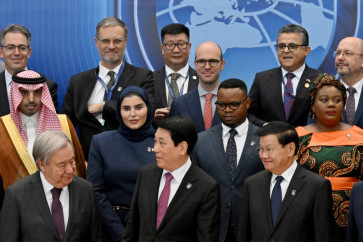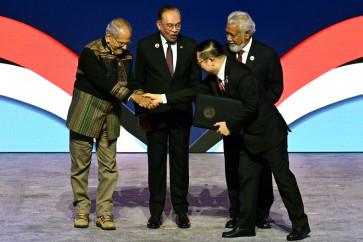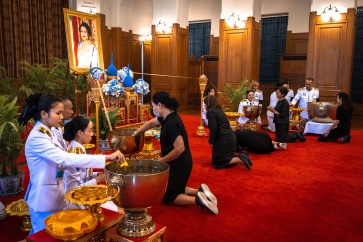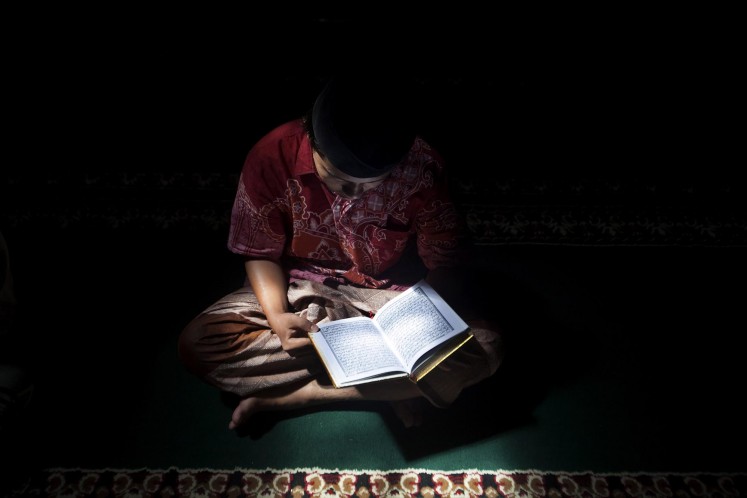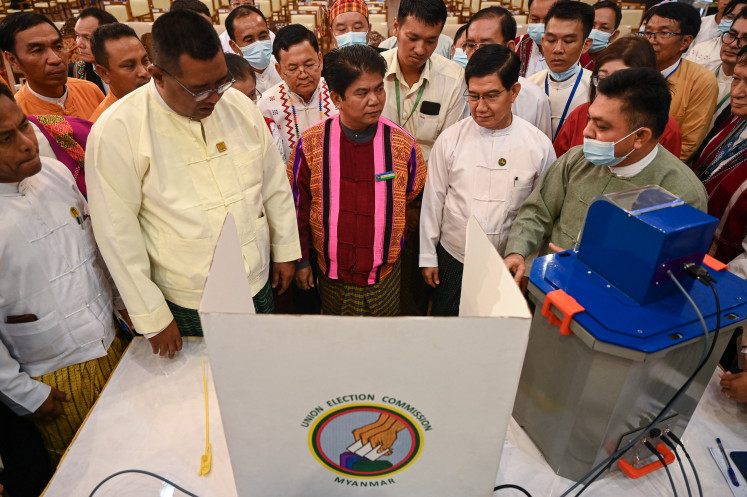Popular Reads
Top Results
Can't find what you're looking for?
View all search resultsPopular Reads
Top Results
Can't find what you're looking for?
View all search resultsArt: Alit Ambara - 'Calling for social and political justice'
Words and photos Luh De SuriyaniFor thousands of years, people have used various art forms and genres to express their talents and aspirations and local and international artists have used a large variety of media, including posters, to channel their messages and challenge values that are not in line with their beliefs
Change text size
Gift Premium Articles
to Anyone
Words and photos Luh De Suriyani
For thousands of years, people have used various art forms and genres to express their talents and aspirations and local and international artists have used a large variety of media, including posters, to channel their messages and challenge values that are not in line with their beliefs.
Last week, an art discussion was held at Rumah Sanur exploring the art of posters as a medium for freedom of expression, social and political statements and as an art genre.
Featuring Alit Ambara, the discussion touched upon sensitive social and political issues in Indonesia, all of which have been portrayed in Ambara's posters.
A number of posters were displayed at Rumah Sanur, one portraying the people's movement in Egypt and that bore the words 'Mubarak, Game Over'. Hosni Mubarak, Egypt's president, was toppled by a wave of mass protests. Another poster revealed a picture of Nawal El Saadawi, a women's activist from Egypt, with the words: 'Tidak ada Demokrasi tanpa Perempuan' (There is no democracy without women).
Ambara, who graduated from the Jakarta Arts Institute (IKJ) and Savannah School of Arts and Design in the US, is one of the most prolific poster artists and designers in Indonesia.
His works are rich in social, political and economic themes. Some posters also show his support for women and posters with environmental and human rights messages have become his signature.
Some of his posters depict situations during the 1965 political upheaval, while others show his concern over the planned Benoa Bay reclamation.
Following the famed Occupy Wall Street movement in New York, which protested the wide social and economic gap between the superrich and the poor in the US, Ambara encouraged artists and people in Jakarta to stage a protest at the Indonesia Stock Exchange (IDX) building in Jakarta.
'Occupy IDX took place for three months in 2011. We just sat there and chatted with security officers and other people working at the building about the economic disparity in Indonesia,' said Ambara.
His posters also speak up for the voiceless and are comprehensive chronicles of people's movements, struggles for justice and hopes for fair and better lives.
He has also portrayed the Jakarta students' movement prior to the fall of president Suharto's New Order regime, the Aceh tragedy and human rights' violations in Indonesia.
Over the three years between 2010 and 2013, Ambara, who was born in Singaraja, produced 800 posters, mostly protests and propaganda featuring farmers, students, minority groups, victims of violence and human rights' violations.
His artistic talents grew when he studied graphic design at IKJ in Jakarta. He also joined Cultural Team Work, which issued a cultural journal entitled Media Kerja Budaya. His political conscience was aroused when he witnessed the ban of cultural activity that featured Magsasay Award winner Pramoedya Ananta Toer, who is his favorite literary figure,
After graduating from IKJ in 1966, he pursued his master degree in America and returned to Jakarta in 1998, at a time when students and activists joined hands to fight against the New Order regime.
'I joined Romo Sandyawan [a Catholic priest and human rights activist],' he said. He was commissioned to produce protest posters depicting the people's movement against human rights' violators.


Since 2010, Ambara has channeled his artistic skills and art work on his own websites nobodycorp.org and posteraksi.org. He also uses social media as platforms for his work, which are produced under creative common license.
His art work can be downloaded without charge for non-commercial purposes. Many students have downloaded his works and reproduced it to create journals, posters and other products.
'I am optimistic that young people in Indonesia are curious and want to learn and seek knowledge [from various sources] in creative ways. What I have been doing is nothing new. This has already existed long before Indonesia's independence, when iconic artists like Chairil Anwar did the same,' he said humbly.



